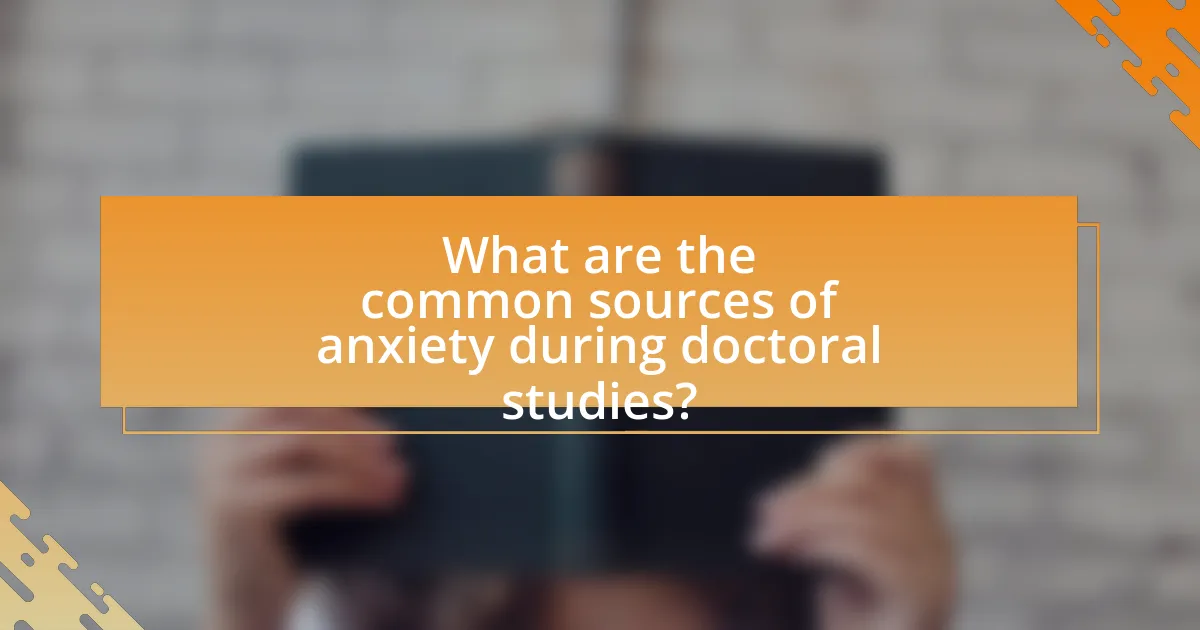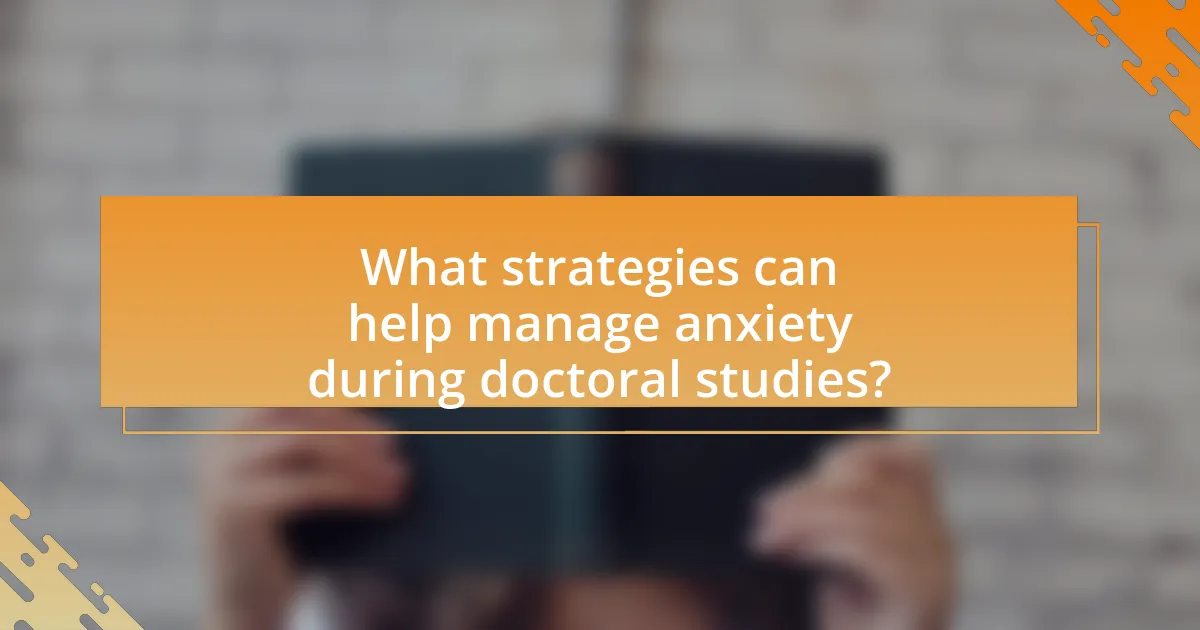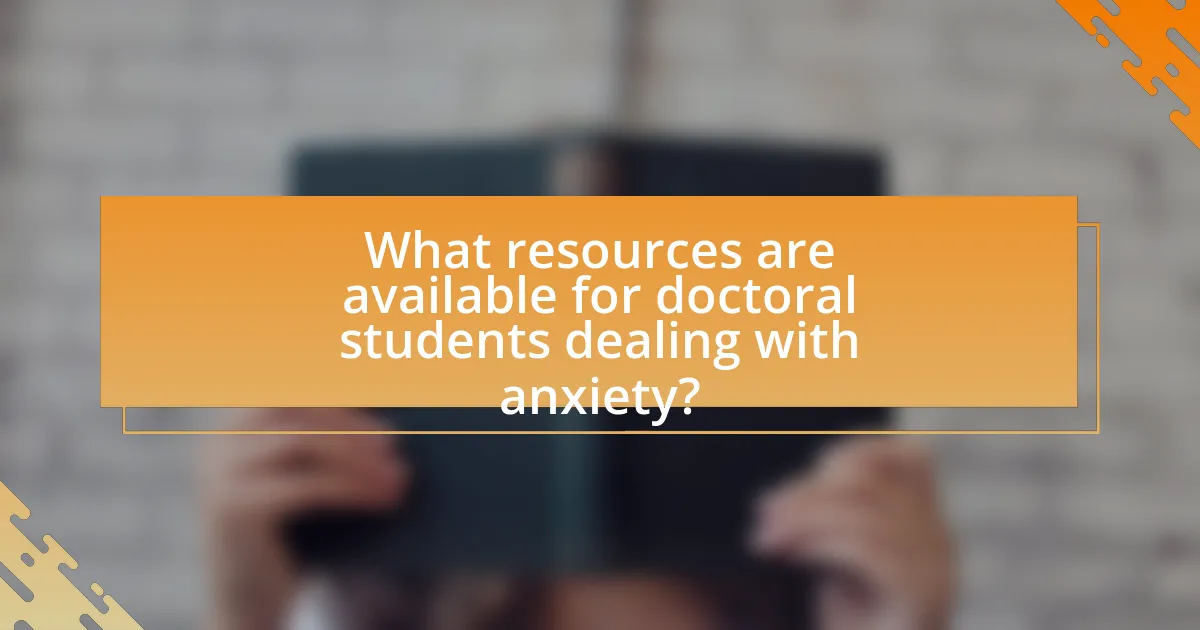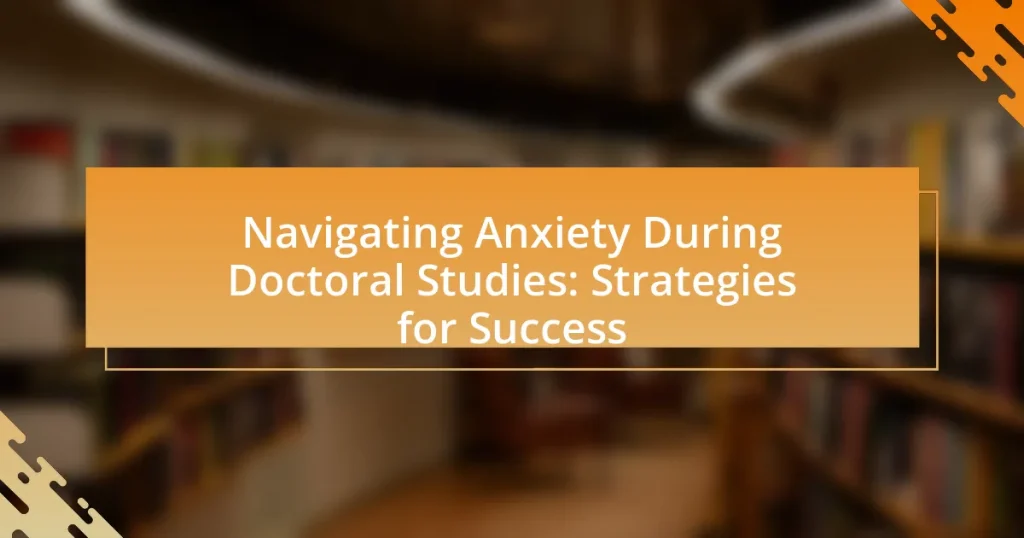The article “Navigating Anxiety During Doctoral Studies: Strategies for Success” examines the prevalent sources of anxiety faced by doctoral students, including academic pressure, isolation, and uncertainty about future career prospects. It highlights how academic challenges, such as high-stakes exams and the competitive environment, contribute to increased anxiety levels. The article also discusses the impact of isolation on mental health and emphasizes the importance of social support in mitigating these feelings. Additionally, it provides practical strategies for managing anxiety, including effective time management, mindfulness practices, and seeking professional help, while outlining available resources for doctoral students to enhance their mental well-being.

What are the common sources of anxiety during doctoral studies?
Common sources of anxiety during doctoral studies include academic pressure, isolation, and uncertainty about the future. Academic pressure arises from high expectations for research output, coursework, and the need to publish, which can lead to stress and self-doubt. Isolation often occurs due to the solitary nature of research work, making students feel disconnected from peers and support systems. Additionally, uncertainty about career prospects and job market conditions contributes to anxiety, as many doctoral candidates worry about their employability after graduation. These factors collectively create a challenging environment that can significantly impact mental well-being during doctoral studies.
How do academic pressures contribute to anxiety?
Academic pressures contribute to anxiety by creating a high-stakes environment where students feel compelled to meet demanding expectations. These pressures often stem from rigorous coursework, the need for high grades, and the competitive nature of academic programs, particularly in doctoral studies. Research indicates that 41% of graduate students report experiencing anxiety, largely due to these academic demands (Eisenberg et al., 2013, “Mental Health of College Students”). The constant worry about performance and the fear of failure can lead to chronic stress, which exacerbates anxiety levels.
What specific academic challenges increase anxiety levels?
Specific academic challenges that increase anxiety levels include high-stakes exams, heavy workloads, and the pressure to publish research. High-stakes exams create significant stress due to their impact on academic progression, with studies indicating that students often experience heightened anxiety in preparation for these assessments. Heavy workloads, characterized by multiple assignments and tight deadlines, can overwhelm students, leading to feelings of inadequacy and anxiety. Additionally, the pressure to publish research, particularly in competitive fields, contributes to anxiety as students fear not meeting expectations or failing to contribute meaningfully to their discipline. These challenges are well-documented in academic literature, highlighting their role in exacerbating anxiety among students.
How does the competitive environment affect doctoral students’ mental health?
The competitive environment negatively affects doctoral students’ mental health by increasing stress and anxiety levels. Research indicates that high competition can lead to feelings of inadequacy and burnout, as students often compare their progress and achievements with peers. A study published in the Journal of Higher Education found that 40% of doctoral students reported experiencing significant anxiety related to competition, which can hinder their academic performance and overall well-being. Additionally, the pressure to publish and secure funding exacerbates these mental health challenges, creating a cycle of stress that can be difficult to escape.
What role does isolation play in doctoral student anxiety?
Isolation significantly contributes to anxiety among doctoral students by exacerbating feelings of loneliness and disconnection from peers and academic support systems. Research indicates that doctoral students often experience social isolation due to the demanding nature of their studies, which can lead to increased stress and anxiety levels. A study published in the journal “Higher Education” found that students who reported higher levels of isolation also experienced greater anxiety, highlighting the detrimental impact of a lack of social interaction on mental health. This correlation underscores the importance of fostering community and support networks to mitigate anxiety in doctoral programs.
How can social support mitigate feelings of isolation?
Social support can mitigate feelings of isolation by providing emotional, informational, and practical assistance, which fosters a sense of belonging and connection. Research indicates that individuals with strong social support networks experience lower levels of anxiety and depression, as these connections offer validation and encouragement during challenging times. For instance, a study published in the Journal of Health and Social Behavior found that social support significantly reduces feelings of loneliness and enhances psychological well-being among students, particularly in high-stress environments like doctoral studies. This support can come from peers, mentors, or family, reinforcing the idea that individuals are not alone in their experiences, thus alleviating feelings of isolation.
What are the impacts of remote learning on student anxiety?
Remote learning significantly increases student anxiety due to factors such as isolation, lack of social interaction, and challenges in adapting to new technologies. Studies indicate that students report higher levels of stress and anxiety when learning remotely compared to traditional classroom settings. For instance, a survey conducted by the American Psychological Association found that 71% of students experienced increased anxiety during remote learning periods, primarily due to feelings of disconnection and uncertainty about their academic performance. Additionally, the shift to online platforms often leads to difficulties in time management and self-discipline, further exacerbating anxiety levels among students.
How do personal factors influence anxiety in doctoral studies?
Personal factors significantly influence anxiety in doctoral studies by affecting students’ emotional resilience and coping mechanisms. Factors such as personal relationships, financial stability, and prior academic experiences can heighten stress levels. For instance, students with strong support systems tend to experience lower anxiety, while those facing financial difficulties may feel increased pressure, as highlighted in a study by Beaudry and Pinard (2019) in the Journal of Educational Psychology, which found that financial stress correlates with higher anxiety levels among graduate students. Additionally, previous negative academic experiences can lead to a fear of failure, further exacerbating anxiety during doctoral studies.
What personal circumstances can exacerbate anxiety levels?
Personal circumstances that can exacerbate anxiety levels include financial stress, relationship issues, and academic pressure. Financial stress arises from concerns about funding, tuition, and living expenses, which can lead to heightened anxiety in students. Relationship issues, such as conflicts with family, friends, or partners, can create emotional turmoil that intensifies feelings of anxiety. Additionally, academic pressure, including the demands of research, deadlines, and performance expectations, can overwhelm individuals, further increasing anxiety levels. These factors are supported by studies indicating that financial instability and social support significantly impact mental health, particularly in high-stress environments like doctoral studies.
How does work-life balance affect doctoral students’ mental health?
Work-life balance significantly impacts doctoral students’ mental health by reducing stress and preventing burnout. When doctoral students maintain a healthy balance between their academic responsibilities and personal life, they experience lower levels of anxiety and depression. Research indicates that students who prioritize work-life balance report higher satisfaction and well-being, which is crucial during the demanding phases of their studies. A study published in the Journal of Educational Psychology found that effective time management and personal time allocation correlate with improved mental health outcomes among graduate students. This evidence underscores the importance of work-life balance in fostering a supportive environment for doctoral students’ mental well-being.

What strategies can help manage anxiety during doctoral studies?
Effective strategies to manage anxiety during doctoral studies include establishing a structured routine, seeking social support, practicing mindfulness, and utilizing time management techniques. A structured routine helps create predictability, reducing feelings of overwhelm; research indicates that consistent schedules can enhance mental well-being. Social support from peers and mentors provides emotional reassurance and practical advice, which has been shown to alleviate stress in academic settings. Mindfulness practices, such as meditation and deep-breathing exercises, have been proven to lower anxiety levels by promoting relaxation and focus. Finally, effective time management techniques, such as breaking tasks into smaller, manageable parts, can prevent procrastination and reduce anxiety associated with deadlines.
How can time management techniques reduce anxiety?
Time management techniques can reduce anxiety by providing structure and predictability in daily tasks. When individuals prioritize and allocate specific time slots for their responsibilities, they can minimize feelings of being overwhelmed. Research indicates that effective time management leads to improved academic performance and reduced stress levels among students, as evidenced by a study published in the Journal of Educational Psychology, which found that students who utilized time management strategies reported lower anxiety and higher satisfaction with their academic experience. By breaking tasks into manageable segments and setting realistic deadlines, individuals can enhance their sense of control, thereby alleviating anxiety associated with uncertainty and procrastination.
What are effective time management strategies for doctoral students?
Effective time management strategies for doctoral students include setting clear goals, prioritizing tasks, and utilizing a structured schedule. By establishing specific, measurable, achievable, relevant, and time-bound (SMART) goals, students can focus their efforts on what is most important. Prioritizing tasks using methods like the Eisenhower Matrix helps students distinguish between urgent and important activities, ensuring that they allocate their time effectively. Additionally, creating a structured schedule that includes dedicated blocks for research, writing, and self-care can enhance productivity and reduce anxiety. Research indicates that students who implement these strategies report higher levels of satisfaction and lower stress levels during their doctoral studies.
How does prioritizing tasks help in managing workload and anxiety?
Prioritizing tasks effectively reduces workload and anxiety by enabling individuals to focus on the most critical responsibilities first. This approach minimizes feelings of being overwhelmed, as it breaks down larger projects into manageable steps, allowing for a clearer path to completion. Research indicates that prioritization can enhance productivity and reduce stress levels; for instance, a study published in the Journal of Applied Psychology found that individuals who prioritize tasks report lower anxiety and higher job satisfaction. By concentrating on high-impact tasks, individuals can allocate their time and energy more efficiently, leading to improved mental well-being during demanding periods, such as doctoral studies.
What role does mindfulness play in reducing anxiety?
Mindfulness plays a significant role in reducing anxiety by promoting present-moment awareness and acceptance, which helps individuals detach from anxious thoughts. Research indicates that mindfulness practices, such as meditation and focused breathing, can decrease anxiety levels by enhancing emotional regulation and reducing rumination. A study published in the journal “Psychological Science” by Keng, Smoski, and Robins (2011) found that mindfulness-based interventions significantly lower anxiety symptoms and improve overall mental well-being. This evidence supports the effectiveness of mindfulness as a strategy for managing anxiety, particularly in high-stress environments like doctoral studies.
How can mindfulness practices be integrated into daily routines?
Mindfulness practices can be integrated into daily routines by incorporating short, focused sessions of mindfulness throughout the day. For instance, individuals can start their day with a five-minute meditation or deep-breathing exercise to set a calm tone. Research indicates that even brief mindfulness practices can reduce stress and improve focus, which is particularly beneficial for doctoral students facing anxiety. Additionally, integrating mindfulness during routine activities, such as mindful walking or eating, allows individuals to cultivate awareness and presence in everyday tasks. This approach not only enhances overall well-being but also supports academic performance by fostering a more focused and less anxious mindset.
What evidence supports the effectiveness of mindfulness for students?
Mindfulness has been shown to be effective for students, particularly in reducing anxiety and improving academic performance. A meta-analysis conducted by Zenner, Herrnleben-Kurz, and Walach in 2014 found that mindfulness interventions significantly reduced anxiety levels among students, with effect sizes indicating moderate to large benefits. Additionally, a study by Khoury et al. in 2015 reviewed 209 studies and concluded that mindfulness-based interventions are effective in enhancing psychological well-being and reducing stress in educational settings. These findings provide strong evidence that mindfulness practices can positively impact students’ mental health and academic success.
How can seeking professional help alleviate anxiety?
Seeking professional help can alleviate anxiety by providing individuals with tailored strategies and therapeutic interventions that address their specific concerns. Mental health professionals, such as psychologists and counselors, utilize evidence-based techniques like cognitive-behavioral therapy (CBT), which has been shown to reduce anxiety symptoms in numerous studies. For instance, a meta-analysis published in the journal “Psychological Bulletin” found that CBT significantly decreases anxiety levels in various populations, demonstrating its effectiveness. Additionally, professional support offers a safe space for individuals to explore their feelings, develop coping mechanisms, and gain insights into their anxiety triggers, ultimately leading to improved mental well-being.
What types of professional support are available for doctoral students?
Doctoral students have access to various types of professional support, including academic advising, mental health services, career counseling, and peer mentoring programs. Academic advising helps students navigate their coursework and research requirements, ensuring they stay on track for graduation. Mental health services provide counseling and support for managing anxiety and stress, which are common during doctoral studies. Career counseling offers guidance on job search strategies, resume writing, and interview preparation, helping students transition into the workforce. Peer mentoring programs connect doctoral students with experienced colleagues who can share insights and coping strategies, fostering a supportive community. These support systems are essential for enhancing the overall well-being and success of doctoral students.
How can therapy or counseling specifically benefit doctoral students?
Therapy or counseling can significantly benefit doctoral students by providing them with coping strategies to manage stress and anxiety associated with their academic journey. These mental health services offer a safe space for students to express their concerns, which can lead to improved emotional well-being and resilience. Research indicates that students who engage in counseling report lower levels of anxiety and higher academic performance, as therapy helps them develop effective time management and problem-solving skills. Additionally, therapy can enhance self-awareness and interpersonal skills, which are crucial for collaboration in research and academic settings.

What resources are available for doctoral students dealing with anxiety?
Doctoral students dealing with anxiety can access various resources, including counseling services, support groups, and academic workshops. Many universities offer mental health counseling specifically tailored for graduate students, providing a safe space to discuss anxiety and develop coping strategies. Support groups, often facilitated by mental health professionals, allow students to connect with peers facing similar challenges, fostering a sense of community. Additionally, academic workshops focusing on stress management, time management, and mindfulness techniques are frequently available, equipping students with practical skills to manage anxiety effectively. These resources are designed to support the mental well-being of doctoral students, helping them navigate the pressures of their studies.
What campus resources can support mental health?
Campus resources that can support mental health include counseling services, mental health workshops, peer support groups, and wellness centers. Counseling services provide professional mental health support through individual and group therapy sessions, which are essential for addressing anxiety and stress. Mental health workshops offer educational programs that teach coping strategies and stress management techniques, helping students develop resilience. Peer support groups create a community where students can share experiences and provide mutual support, fostering a sense of belonging. Wellness centers often provide holistic resources, including mindfulness sessions and physical fitness programs, which contribute to overall mental well-being. These resources are critical for students navigating the challenges of doctoral studies, as they promote mental health awareness and provide necessary support systems.
How can academic advisors assist in managing anxiety?
Academic advisors can assist in managing anxiety by providing personalized support and resources tailored to students’ needs. They can help students identify specific stressors related to their academic journey, such as workload, time management, and research challenges. By offering strategies for effective study habits, goal setting, and prioritization, advisors can empower students to develop coping mechanisms. Additionally, academic advisors can connect students with mental health resources, such as counseling services, which have been shown to reduce anxiety levels among graduate students. Research indicates that students who engage with academic support systems report lower anxiety and improved academic performance, highlighting the effectiveness of advisor involvement in mental health management.
What role do student organizations play in providing support?
Student organizations play a crucial role in providing support to doctoral students by fostering a sense of community and offering resources tailored to their unique challenges. These organizations facilitate networking opportunities, enabling students to connect with peers who share similar experiences, which can alleviate feelings of isolation often associated with doctoral studies. Additionally, they often provide workshops, mentorship programs, and access to mental health resources, which are essential for managing anxiety. Research indicates that involvement in student organizations can lead to improved academic performance and well-being, as students who engage in these communities report higher levels of satisfaction and lower levels of stress.
How can online resources aid in anxiety management?
Online resources can significantly aid in anxiety management by providing accessible information, support communities, and self-help tools. These resources include websites, apps, and online forums that offer evidence-based strategies for coping with anxiety, such as cognitive-behavioral techniques and mindfulness practices. For instance, a study published in the Journal of Medical Internet Research found that online interventions can reduce anxiety symptoms effectively, demonstrating their validity as a management tool. Additionally, platforms like online therapy services connect individuals with licensed professionals, allowing for personalized support that can be tailored to specific needs.
What are some recommended online platforms for mental health support?
Some recommended online platforms for mental health support include BetterHelp, Talkspace, and 7 Cups. BetterHelp offers a wide range of licensed therapists and flexible communication options, making it accessible for users seeking therapy. Talkspace provides therapy via text, audio, and video, catering to different preferences and schedules. 7 Cups focuses on peer support and offers free chat with trained listeners, making it a valuable resource for those in need of immediate emotional support. These platforms are recognized for their effectiveness in connecting individuals with mental health professionals and support networks.
How can self-help tools and apps be utilized effectively?
Self-help tools and apps can be utilized effectively by setting specific goals and regularly tracking progress. Users should identify their unique needs, such as stress management or time management, and select tools that align with those needs. For instance, research indicates that goal-setting can enhance motivation and accountability, leading to improved outcomes in mental health (Locke & Latham, 2002). Additionally, incorporating reminders and notifications from these apps can help maintain consistency in practice, which is crucial for developing new habits. Regular engagement with the tools, such as daily check-ins or journaling, reinforces their effectiveness in managing anxiety during doctoral studies.
What practical tips can doctoral students implement to cope with anxiety?
Doctoral students can implement several practical tips to cope with anxiety, including establishing a structured routine, practicing mindfulness, and seeking social support. A structured routine helps students manage their time effectively, reducing feelings of overwhelm; research indicates that time management skills can significantly lower anxiety levels among graduate students. Mindfulness practices, such as meditation and deep-breathing exercises, have been shown to decrease anxiety symptoms by promoting relaxation and enhancing focus. Additionally, maintaining a support network of peers, mentors, and family can provide emotional reassurance and practical advice, which is crucial for managing stress during challenging academic periods.



